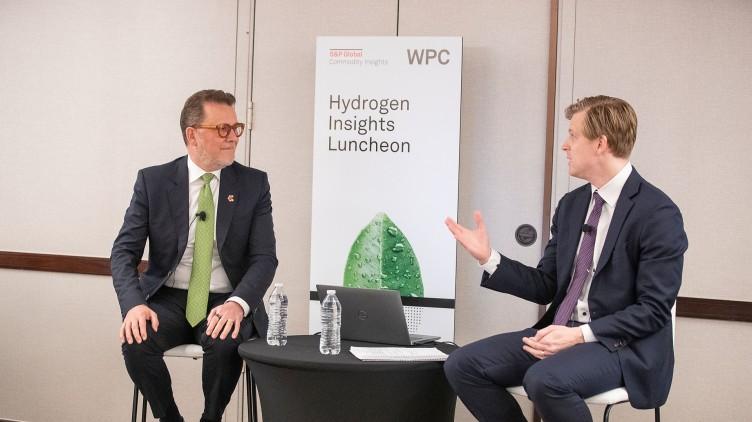We Need Chemistry to Scale the Hydrogen Economy – And Not Just the Scientific Kind
Published 04-03-23
Submitted by The Chemours Company

Mark E. Newman, President and Chief Executive Officer at The Chemours Company
Last week I attended the 38th Annual World Petrochemical Conference in Houston, TX—the energy capital of the world. And while Houston is synonymous with oil and gas, I was excited to take part in a great conversation about another energy source that is critical to a cleaner and more sustainable future—hydrogen.
As we work to build that future, we must turn to energy solutions that fuel our planet cleanly, efficiently, and perpetually – solutions like green hydrogen, which can cleanly power everything from cars to heavy industry if harnessed effectively.
With a favorable policy environment and continued investment, we could soon make this dream our reality. In fact, earlier this year Chemours announced a $200 million investment in France to help unlock the potential of hydrogen energy in Europe and globally. We announced that investment in part because of the strong alignment between our sustainable growth vision, the French and local governments’ goals to create a reliable and strong hydrogen economy, and the EU’s ambition to deliver a clean energy transition.
Hydrogen as a fuel holds significant promise, but more work is needed to ensure that our technological capabilities meet our ambitions for the hydrogen economy.
This is where chemistry comes in – both scientific and human.
Advanced chemistries sit at the heart of critical clean energy technologies.
Green hydrogen is created when water, using renewable energy sources such as wind and solar energy, is split into hydrogen and oxygen through a process called water electrolysis. That green hydrogen can then be converted to electricity through fuel cells to power electric vehicles including heavy-duty and commercial passenger transport—yielding only water and heat as byproducts.
These promising clean energy technologies depend on chemistry—specifically the highly specialized ion-exchange membranes that facilitate the chemical reactions at the heart of hydrogen production and use. In recent years, some of the best minds in the field of advanced chemistry and material science have made groundbreaking advancements to make these membranes more durable, efficient, and reliable. Through their efforts, today's membranes are merely the thickness of a human hair and yet can withstand high temperatures and pressures, keep the produced hydrogen and oxygen separated, and allow for the efficient transfer of protons through the membrane—improving efficiency and productivity.
And it’s not just the resulting green hydrogen that will help sustain the planet, but also the responsible manufacturing of the materials needed. With continued innovation in the industry, we can develop manufacturing technologies in a way that is sustainable for our environment, climate, and people.
A responsible approach – not just at Chemours but across the landscape of suppliers, customers, and regulators – is required for true environmental protection and sustained innovation.
The success of the hydrogen economy requires more than science.
We also need another kind of chemistry – the collaboration among people working together toward a shared purpose. We must encourage strategic investment across the value chain.
In Europe, we’ve already seen significant progress through policies like the European Green Deal, which embraces hydrogen energy as part of the solution to achieve net-zero greenhouse gas emissions by 2050. In the U.S., meanwhile, the Inflation Reduction Act (IRA) included research and development credits and incentives related to electrolysis and fuel cells – all of which are critical to strengthening domestic manufacturing of clean energy solutions, creating high-paying, sustainable jobs, and advancing American energy independence.
To scale our hydrogen future, government and industry should take a comprehensive view of the clean energy value chain. While incentives like those in IRA are critical, we must also have regulatory certainty that allows industry to best utilize those incentives to drive investments and growth in green jobs. We need to work together toward policies that expand domestic supply chains and advance the hydrogen economy. The same can be said for semicon, electric vehicles, and other technologies that are critical to the future economy. This requires rational, science-based regulations that protect human health and the environment and still allow for economic growth.
A sound regulatory environment includes an efficient permitting process. In the U.S., for instance, the bipartisan support for permitting reform from Senator Manchin, Senator Capito, and others is a prime example of the role government can play in enabling innovation and unlocking the potential of clean energy production. That kind of regulatory certainty can drive growth in the hydrogen economy while helping advance decarbonization efforts.
The fact is, robust public-private partnerships and sound public policy can amplify our scientific and technological know-how, make productive infrastructure investments, and build a competitive ecosystem and regulatory environment.
The psychiatrist Carl Jung once used the language of chemistry to illuminate his own science. He likened the meeting of two personalities to the contact of two substances: “if there is any reaction,” he wrote, “both are transformed.” I’ve seen this firsthand. Chemours – and the advanced chemistries we produce – have been radically transformed by partnerships with governments, other companies, and leading university researchers.
To secure our clean energy future, we must continue to pursue partnerships, investments, and regulatory certainty to unlock transformative innovation across the value chain – from a diverse array of end uses all the way back to the most basic building block of our universe: the hydrogen atom.
Mark Newman is the President and CEO of The Chemours Company, a different kind of chemistry company whose products impact every part of modern day living and enable a greener, low carbon future.

The Chemours Company
The Chemours Company
About The Chemours Company
The Chemours Company (NYSE: CC) is a global leader in providing industrial and specialty chemicals products for markets, including coatings, plastics, refrigeration and air conditioning, transportation, semiconductor and advanced electronics, general industrial, and oil and gas. Through our three businesses – Thermal & Specialized Solutions, Titanium Technologies, and Advanced Performance Materials – we deliver application expertise and chemistry-based innovations that solve customers’ biggest challenges. Our flagship products are sold under prominent brands such as Opteon™, Freon™, Ti-Pure™, Nafion™, Teflon™, Viton™, and Krytox™. Headquartered in Wilmington, Delaware and listed on the NYSE under the symbol CC, Chemours has approximately 6,000 employees and 28 manufacturing sites and serves approximately 2,500 customers in approximately 110 countries. For more information, visit chemours.com or follow us on LinkedIn.
More from The Chemours Company

